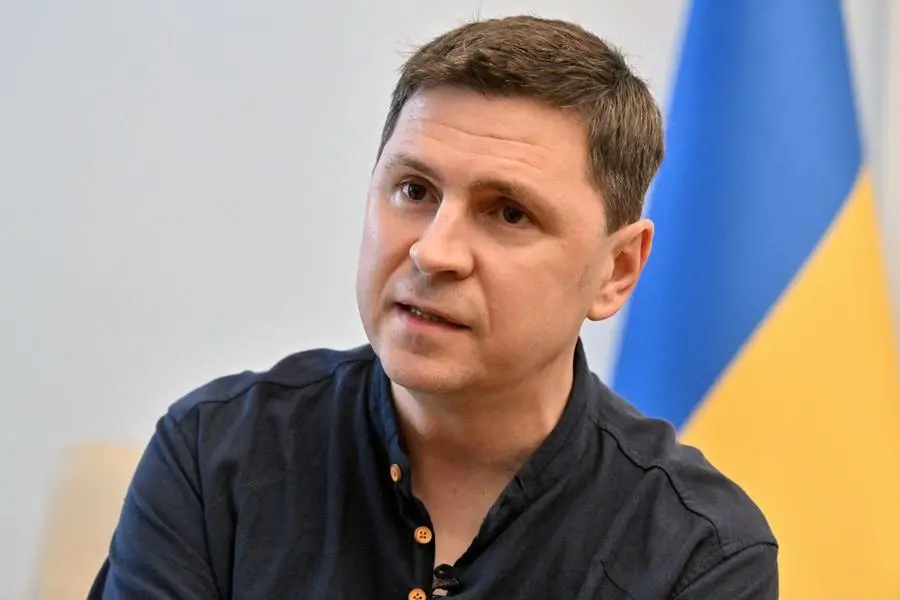PHOTO
When delegations from Moscow and Kyiv met in Belarus for secretive peace talks weeks after Russia invaded Ukraine, it took Ukraine's lead negotiator less than an hour to lose hope.
To end the war, Russia had dispatched a former culture minister -- infamous for a PhD plagiarism scandal -- and a firebrand nationalist who had recently faced down sexual harassment allegations.
"It was about 45 minutes into the first round of talks that the intellectual level of these people became clear -- their lack of understanding that the war was a war," Mykhaylo Podolyak told AFP during a recent interview in Kyiv.
"These people were not prepared to negotiate. They were just technical staff with nearly no influence in Russia. They came, read out certain ultimatums, and that's it!" the presidential advisor added.
Almost two years after those meetings collapsed, there are growing calls for Ukrainian officials to return to negotiations with the Kremlin to hash out a diplomatic end to the fighting.
Those pleas are coming in the wake of a disappointing Ukrainian counteroffensive that -- despite stockpiles of Western weapons -- failed to win back territory in the south or east.
And they are building as concerns grow over the West's commitment to supporting Ukraine, and disruptions to ammunition deliveries.
- 'Habitual liar' -
But for Ukraine, talks are off the table.
Officials say almost all agreements that Kyiv entered into since the collapse of the Soviet Union were scrapped by Moscow, and that sitting down with Russia is pointless at best and dangerous at worst.
"Putin is a habitual liar who promised international leaders that he would not attack Ukraine days before his invasion in February 2022," Ukraine's foreign minister said recently.
He cited agreements from 1994, 1997, 2014 and 2015 in which Russia had agreed to recognise and respect Ukrainian territorial integrity or commit to terms of fighting that Kuleba said Moscow had brazenly disregarded.
In October last year -- days after the Kremlin annexed swathes of Ukrainian territory -- President Volodymyr Zelensky signed a decree ruling out talks with Moscow as long as Putin was in power.
The decision was informed by Ukraine's discovery of mass civilian killings in places like Bucha, where Zelensky said evidence of atrocities made the prospect of talks "harder".
The Kremlin, by contrast, has often said that it is ready to sit down with Ukraine.
"Russia has never rejected peace talks with Ukraine. It was not Russia, but Ukraine that publicly announced that it was withdrawing from the negotiation process," President Vladimir Putin told G20 leaders this month.
"We have to think about how to stop this tragedy," he added.
For Nigel Gould-Davies, a former British ambassador to Belarus, the Russian leader's comments should be taken with a grain of salt.
- 'Pretending to want peace' -
The Kremlin would benefit from entering into talks that would give it time to reconstitute its military for later attacks, he told AFP.
And, he said, Putin's comments could be seen as an effort to placate Russians who are increasingly eager for the war to end, recent polling shows, ahead of elections scheduled for March.
"Putin has nothing to lose by pretending to want peace," Gould-Davies said.
Andrei Kozyrev, a former Russian foreign minister now living in the United States, put it more bluntly in a recent commentary.
Putin "might pretend to compromise at an opportune moment only to go to war next."
Echoing talking points in Kyiv, Kozyrev argued the only way to end the fighting was to give Kyiv the "most potent weapons to defeat the invaders as soon as possible."
There have however been glimmers of hope that contact between the two sides could bear fruit.
Among them, Moscow and Kyiv last year signed separate accords with the UN and Turkey to secure shipments of grain out of Ukraine's Black Sea ports.
But Moscow scrapped the deal less than one year later, claiming its interests had been overlooked.
Even if Russian and Ukrainian delegations were to sit down at this stage in the conflict, they would have nothing to talk about, former negotiator Podolyak said.
"They have military arguments: 'We will continue to attack you.' We have the argument: 'We will defeat you.'"
"These are not negotiating positions," he told AFP. "The point of no return has been passed."





















